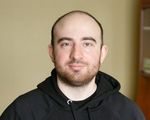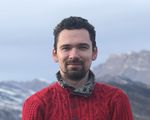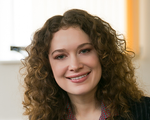About Success Builder
How do you find your place in life? How do you find something to do that both comes naturally to you and makes you happy? The answer is that you have to apply the knowledge you’ve gained from university and from life itself correctly. The Success Builder Project features HSE University graduates who have discovered themselves through an interesting business or an unexpected profession. The protagonists share their experiences and lessons learnt and talk about how they’ve made the most of the opportunities they were given.
Data Science is becoming an integral part of fundamental education — particularly in economics — and the university’s industry ties make it possible for students to ‘get a feel’ for the professional environment where they will be developing in the workplace. Ksenia Totmyanina, graduate of the HSE University Faculty of Economic Science and the current Managing Director of the Sberbank Data Research Competency Development Center, talks about the importance of case studies for students, what it feels like to be a ‘woman in IT’ and why the people at Sberbank are unafraid that artificial intelligence will replace humans.
Why did you choose to study economics?
I realized that I wanted to study economics while still in Perm. The bachelor’s programme included a course on banking. After that, I felt that I would really like to study the principles of how financial institutions work. I found out that the HSE campus offered a master’s programme in Banking. I found this much more interesting than management and the programme included more math-related courses and work with numbers and models.
Why do students often seek internships with foreign companies?
I began working in a foreign bank almost immediately after starting my master’s studies. Such experience really is useful and improves a beginner’s portfolio. Foreign banks have decades of experience offering a variety of financial services and products on the international market. By working as an employee or intern with such companies, you see how to build processes, systems, etc.
At that time, the bank was in the process of introducing the Basel Standards for the Russian market. (These standards and methods for regulating banking activity were developed by the Basel Committee on Banking Supervision — Editor.) In England, these standards have long been mandatory, so there was much to learn. After working there, I became interested in how international standards would ‘take root’ in Russian soil and was looking for an opportunity to use my experience in Russian finance. At that moment, specialists in Basel practice were in great demand, and this is how I wound up at Russia’s largest banking structure, Sberbank, where I have been working for almost 10 years now.
Has your work always dealt with data analysis?
I started out working in the finance department where I reported on Basel standards. And when I moved to Sberbank, I ended up in the risk department in a project for introducing Basel II standards and integrated risk management, including models of economic capital, equity return based on risk and stress testing. It was incredibly interesting and, as a result, I made a smooth transition to how various mathematical models should be developed and implemented, which is an integral part of working with data.
How were you able to combine work with graduate studies? Why didn’t you choose teaching and an academic career in general?
When you’re carrying a heavy load, it is important to be able to plan your time: then you have the chance to achieve more. I like teaching at HSE University (Ksenia Totmyanina is a guest lecturer with the School of Finance Faculty of Economic Sciences — Editor) and I value the experience of communicating with students. At Sberbank, I have also taught at the Corporate University where employees of the bank’s various divisions study. I think I will expand my teaching activities in the future, but that requires an investment of time and resources. For now, I am more focused on my main line of work.
In which area of research are you interested?
Whereas I used to focus on reporting, risk management and integrated risks, I now specialize more in developing competencies for data research and introducing technologies in banking processes.
At what point and why did you switch to data science?
It all came about very naturally. Because I worked in risk management where calculations are based on mathematical models, and all risk is evaluated on the basis of statistical data, the idea arose that the models should be used more widely in all business processes. This is how our division came into being.
How have the structure and principles of banking changed over the years, especially in connection with the trend towards digitalization?
During my time in banking work, I have done something new every year. In this organization, nobody ever stays in one place, and because the AI field is developing like crazy, we also try to master and apply new practices and methods. And in a bank, you can get involved in a major innovative project at any time. This is one of the reasons why I think that working at Sberbank is always interesting.
Does Sberbank have its own methods for teaching teamwork?
We have various teamwork trainings and courses, including the agile principle. But mainly, the leader needs to assemble a team and put the work processes in place. If you achieve results, you are given tasks that are more ambitious. You earn their trust, and this makes you feel driven to develop.
How did you master the technical skills necessary to work at the juncture of finance and technology?
I took numerous courses, both online and at Sberbank. The background in math that I got from HSE and my university education, in general, helped a lot.
How important is it for economics students to learn programming skills and work with big data while they are still at the university?
It is super important, not only for economists, but for students of all disciplines. I would also recommend that universities teach more math.
It is necessary to teach the basics of working with models and neural networks. Programming should be required for everyone
We live in an era of digital technology, when gadgets, apps and big data determine the direction of business. Most communications take place via smartphones. This transforms every area of business and entire industries. And this puts new demands on competencies in all specialities.
Which jobs do you give to recent graduates?
Data researcher is the most common in our area. This is a specialist engaged in the development and maintenance of the model at the implementation stage. If the person has only limited work experience in this area, he first studies with a more experienced specialist and is responsible for only a small part of this process.
Some think that, in the near future, artificial intelligence — that you, yourself are helping to develop — will take over all positions related to analytics and data processing and collection.
I don’t think that will happen. It is mistaken to believe that AI will replace people. It would be more accurate to ask how and in which areas AI will help us. AI can take over routine operations so that human intelligence can be put to more effective use, particularly in complex projects with creative tasks that require making difficult decisions and critical thinking.
What sort of work does your unit do?
Our unit is responsible for popularizing and developing data analysis and artificial intelligence technologies in Sberbank, including for the development and implementation of models. It is also important for us to bring development teams from various divisions of the bank together and create a common platform for collaborating and sharing knowledge. We develop various techniques, documents and standards connected with the modernization process. My focus is on the development of methodology as well as the internal and external community of DS/AI specialists.
The bank has a well-developed community of data researchers that regularly conducts networking events. We hold various conferences, ‘hackathons’ and meetings at which DS/AI specialists can discuss what is happening in the field of AI technologies at the bank and in the world generally.
How does your unit work with interns? Do you have anyone from HSE University?
Sberbank has a separate Sberseasons programme for interns. Students must submit an application and go through an interview to participate. Of course, there are many HSE students among the interns.
Does this programme provide an opportunity to gain applied skills?
Of course, as well as an understanding of which approaches and modelling methods are now in use. The most important thing, however, is not simply to develop a model but to use it to actually solve a business objective. This is why case studies are an important skill for any student aiming for a career in this field.
What is the situation for women in IT, given the gender-equal environment in the workplace now?
We have always had a number of women on our team and we have no trouble working in this field. In my opinion, professional skills, experience, the ability to organize work and take responsibility for the result are important in IT, not gender.
You have a European approach to doing business. Have you ever had to represent Sberbank at an international venue?
We have many projects focused on developing AI and data science in Russia and abroad. For example, we are currently developing an Artificial Intelligence Journey project. This is a whole series of events for AI and data analysis, and particularly a major conference that was held on November 8-9 in Moscow that brought together world-class AI experts, as well as an international online competition for developing powerful AI. That project also includes the holding of regional conferences in seven Russian cities from Vladivostok to Kaliningrad.
AI technology is an extremely high-speed field: we must constantly keep our finger on the pulse of global trends
We regularly participate in international AI conferences such as NeurIPS (The Conference and Workshop on Neural Information Processing Systems). This is one of the world’s largest conferences in this field and it has been held for the last 30 years. Speakers talk about the latest trends, research and development in this area, and we also introduce our speakers to the international community.
What knowledge and skills help you in this continuous ‘upgrade’?
I often recall group work at HSE when we were given a large project or case study and were tasked with finding a solution as a team. This taught us to delegate tasks, communicate, make plans and to meet deadlines. HSE University taught me to take responsibility for my actions and foresee the final result.















































































































































